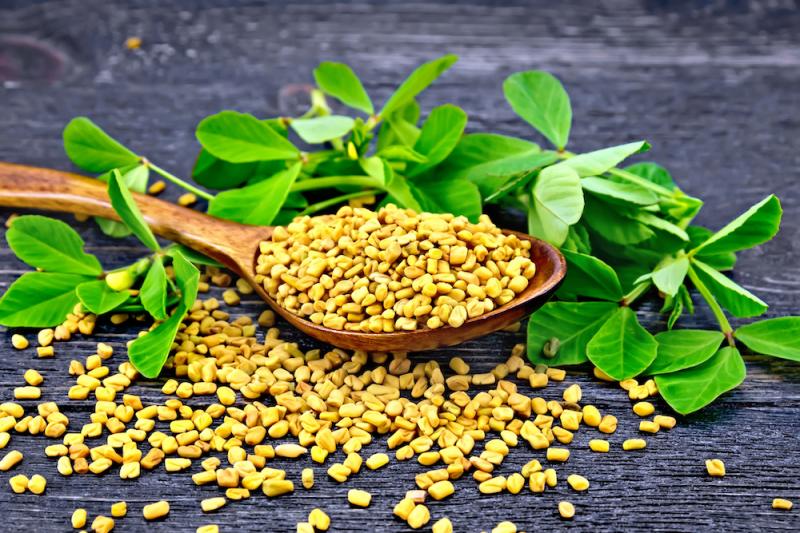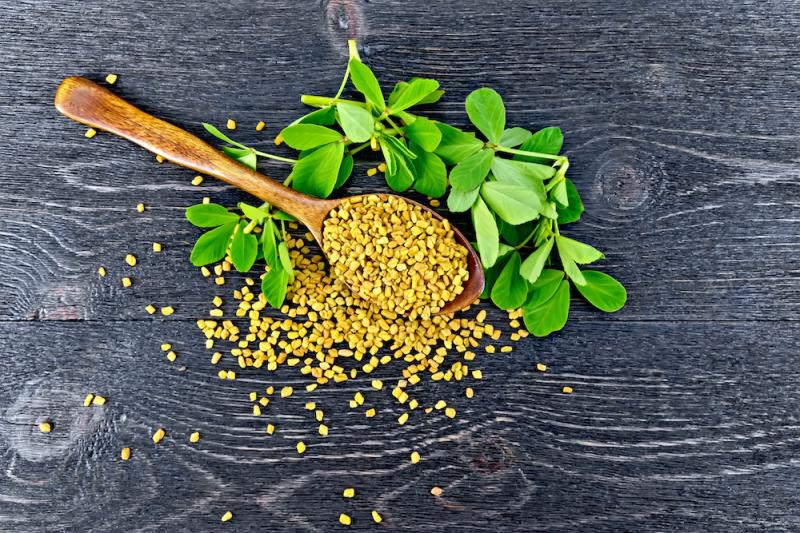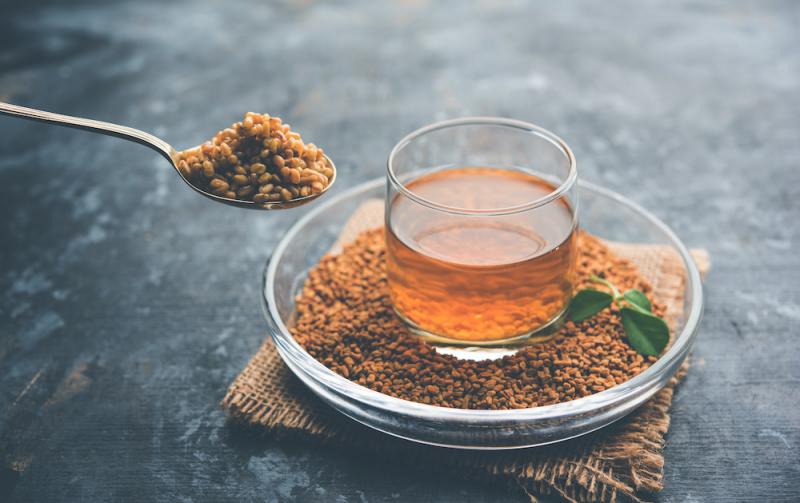
Even though there is access to a wide variety of information on the web, it can be easy to miss out on the valuable information found in various herbal traditions around the world. For example if you are searching for information on fenugreek and find the entry on Wikipedia it will tell you that “there is no clinical evidence that fenugreek has therapeutic properties.”
Contrast this with one of my Ayurvedic reference books, Ayurvedic Herbs by Virender Sodhi, an Ayurvedic medical doctor and naturopath. He reviews six studies showing that fenugreek has some degree of antidiabetic activity. He also reports that he has successfully used it for both type 1 and type 2 diabetes in clinical practice.
Since 80% of the world’s fenugreek production comes from India, where fenugreek is widely used as a seasoning as well as a medicine, so I think that Ayurvedic practitioners probably have enough experience to know. And, based on my own experience with the plant, I can tell you that I've found that fenugreek has a lot of useful therapeutic properties.
Fenugreek and Blood Sugar
 To start with, fenugreek can help lower blood sugar. The reason why Western science can't confirm this is because the results of studies are mixed. And because Western science is reductionistic it needs a hypothesis with a narrow isolated scope and a clear yes or no answer. A typical study on fenugreek and blood sugar is looking only at blood sugar. In other words, they’re looking for something that dependably does one thing, lower blood sugar for the general population.
To start with, fenugreek can help lower blood sugar. The reason why Western science can't confirm this is because the results of studies are mixed. And because Western science is reductionistic it needs a hypothesis with a narrow isolated scope and a clear yes or no answer. A typical study on fenugreek and blood sugar is looking only at blood sugar. In other words, they’re looking for something that dependably does one thing, lower blood sugar for the general population.
But traditional herbalism doesn’t work that way. It’s based on practical experience, the direct observation of living systems, and the application to individuals. Through hundreds and sometimes thousands of years of observation by multiple healers, observations have been made about how whole plants affect whole human beings, not just one chemical isolated from a plant affecting one biological process such as blood sugar levels. It’s critical to understand the difference.
There are many herbs that have a blood sugar-reducing effect. They include cinnamon, nopal, fenugreek, bitter melon, gymnema, and many more. But these herbs are not the same. All of them do other things in addition to helping reduce blood sugar. They also have different energetic qualities. Cinnamon is aromatic and astringent, which makes it warming, drying, and toning. Nopal, on the other hand, has a completely opposite energy. It’s mucilaginous, which makes it cooling and moistening. Herbs are not well matched to diseases with singular symptoms such as high blood sugar. They are better matched to an overall picture of the person taking them.
Fenugreek’s Wider Actions
Fenugreek has a bitter-sweet flavor and is slightly drying and nourishing. It’s been used as an animal feed because of its nutritional value. It’s been used to strengthen the body during convalescence. It has also been used to encourage weight gain when someone has lost weight because of sickness, but it can also help people lose weight too. It also helps to lower cholesterol and has a mild appetite-reducing effect.
Another traditional use for fenugreek is to aid breastfeeding. Fenugreek has been reported to encourage breast milk production, but it’s also reported to “sweeten” the milk. What this means is that if an infant is becoming colicky and fussy after nursing, fenugreek seems to help the baby tolerate the breast milk better. I tried this traditional use out with one of my children who was having difficulty breastfeeding. It was like his mom’s milk was souring his stomach. I had his mom take marshmallow and fenugreek and it really seemed to help. While this is just one anecdote, when it is combined with the numerous other positive experiences others have had, it is enough evidence for me that I would encourage mothers with similar problems to try it out as a remedy. After all, it's a very safe herb.
Fenugreek in Formulas
 Most of my experience with fenugreek comes from using it in combination with other herbs. The combination of marshmallow and fenugreek is one example. In addition to being a good formula aid breast milk production, it is also good for moistening the lungs where there is a dry cough.
Most of my experience with fenugreek comes from using it in combination with other herbs. The combination of marshmallow and fenugreek is one example. In addition to being a good formula aid breast milk production, it is also good for moistening the lungs where there is a dry cough.
Another useful combination is fenugreek and thyme. This is one of the better remedies I know for clearing out chronic sinus congestion and easing sinus headaches. It helps fight sinus infection and helps the loosen the mucus so it can drain properly.
I also used fenugreek in a blood sugar formula I helped create. The primary ingredient in the formula was cinnamon, but understanding that cinnamon is warming and drying, I wanted to balance out the action of cinnamon with more cooling and moistening herbs so it would be more readily tolerated by people who may be slightly constipated or suffer from indigestion from spicy foods.
I balanced the action of the cinnamon with nopal and fenugreek, which have more cooling and soothing properties. Both of them also help regulate blood sugar, so they balance out the energy of the formula and still contribute to the overall action.
Using Fenugreek
 So, if you tend to be overweight or weak and have blood sugar problems, or if you're a mother who is having difficulty nursing, you may want to try using fenugreek. You can easily make a decoction of it. Simmer 1-1/2 teaspoons per cup of water for about 10 minutes. You can drink up to three cups a day. In the Ayurvedic herb book mentioned earlier, Dr. Sodhi says he has patients soak one tablespoon of the seeds in water overnight to soften them and then eat them in the morning. They could also be added to a breakfast smoothie. You can also take one capsule three times a day.
So, if you tend to be overweight or weak and have blood sugar problems, or if you're a mother who is having difficulty nursing, you may want to try using fenugreek. You can easily make a decoction of it. Simmer 1-1/2 teaspoons per cup of water for about 10 minutes. You can drink up to three cups a day. In the Ayurvedic herb book mentioned earlier, Dr. Sodhi says he has patients soak one tablespoon of the seeds in water overnight to soften them and then eat them in the morning. They could also be added to a breakfast smoothie. You can also take one capsule three times a day.
Fenugreek seed powder can also be used in poultices to soothe irritated skin or you could apply a compress or fomentation of the decoction. Fenugreek has a soothing, anti-inflammatory effect and can be helpful topically for burns, skin ulcerations, abscesses, and minor injuries. The herb is safe, but some people may have allergic reactions to it, so if you experience digestive upset or allergy symptoms from it simply discontinue using it.
Downloads
Steven's Articles
October
-

-
Understanding Caffeine & Cellular Adaptation
Preserving the power of caffeine's buzz and the…
September
-

-
Horseradish
A pungent spice for aiding protein metabolism…
-

-
Banaba or Crepe Myrtle
A beautiful tree from Southeast Asia whose leaves…
August
-

-
Monkeyflowers
Flower essences to help see ourselves more clearly…
-

-
Mariposa Lilies
Strengthening the bond between mother and child…
-

-
The Noble Bay Leaf
A common kitchen herb for aiding digestion and…
-

-
Epimedium: Horny Goat Weed
A circulatory stimulant and kidney yang tonic…
July
-

-
The Medicinal and Nutritional Benefits of Apricots
A nutritious fruit and valuable medicinal seed for coughs
-

-
Dogwoods
Asian dogwood is used to stop excessive discharge,…
June
-

-
Neem: The Village Pharmacy
A popular Ayurvedic remedy for dental and immune…
-

-
Spilanthes: The Toothache Plant
A traditional remedy for teeth and gums, as well…
-

-
Forsythia
An anti-inflammatory, fever-reducing, and infection fighting herb
May
-

-
Buckwheat (Kashi)
A delicious, high protein, gluten-free, gut-healthy food
-

-
Leaky Gut Syndrome
Plugging the leaks on the underlying cause of…
-

-
Storksbill
An edible, medicinal, weedy herb, helpful for…

